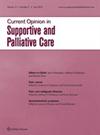Should opioids be used for breathlessness and in whom? A PRO and CON debate of the evidence.
IF 2
4区 医学
Q3 HEALTH CARE SCIENCES & SERVICES
Current Opinion in Supportive and Palliative Care
Pub Date : 2023-12-01
Epub Date: 2023-10-26
DOI:10.1097/SPC.0000000000000674
引用次数: 0
Abstract
Purpose of review The net clinical benefit of opioids for chronic breathlessness has been challenged by recent randomized clinical trials. The purpose was to review and weigh the evidence for and against opioid treatment for chronic breathlessness in people with serious disease. Recent findings Evidence to date on the efficacy and safety of opioids for chronic breathlessness was reviewed. Findings supporting a benefit from opioids in meta-analyses of earlier, mostly smaller trials were not confirmed by recent larger trials. Evidence pertains mostly to people with chronic obstructive pulmonary disease but also to people with pulmonary fibrosis, heart failure, and advanced cancer. Taken together, there is no consistent evidence to generally recommend opioids for severe breathlessness or to identify people who are more likely to benefit. Opioid treatment may be tested in patients with intractable breathlessness and limited other treatment options, such as in end-of-life care. Knowledge gaps were identified and recommendations were made for future research. Summary Key Points Supportive findings of net benefit of opioids for chronic breathlessness in earlier trials have not been confirmed by recent larger randomized clinical trials. There is no evidence that the opioid treatment improves the person’s exercise capacity or quality of life, and it increases the risk of adverse events. Evidence to date does not support that opioids should generally be recommended for treating breathlessness. In people with intractable symptoms and short expected survival, with few or no treatment options, it may still be reasonable to try opioid treatment with the aim to alleviate severe breathlessness. Research is needed to explore the potential benefit of opioids in selected patient groups. Opioids cannot be generally recommended for treating breathlessness based on insufficient evidence for net clinical benefit.阿片类药物应该用于治疗呼吸困难吗?用于治疗谁?证据的正反辩论。
本文章由计算机程序翻译,如有差异,请以英文原文为准。
求助全文
约1分钟内获得全文
求助全文
来源期刊

Current Opinion in Supportive and Palliative Care
HEALTH CARE SCIENCES & SERVICES-
CiteScore
3.70
自引率
0.00%
发文量
54
期刊介绍:
A reader-friendly resource, Current Opinion in Supportive and Palliative Care provides an up-to-date account of the most important advances in the field of supportive and palliative care. Each issue contains either two or three sections delivering a diverse and comprehensive coverage of all the key issues, including end-of-life management, gastrointestinal systems and respiratory problems. Current Opinion in Supportive and Palliative Care is an indispensable journal for the busy clinician, researcher or student.
 求助内容:
求助内容: 应助结果提醒方式:
应助结果提醒方式:


